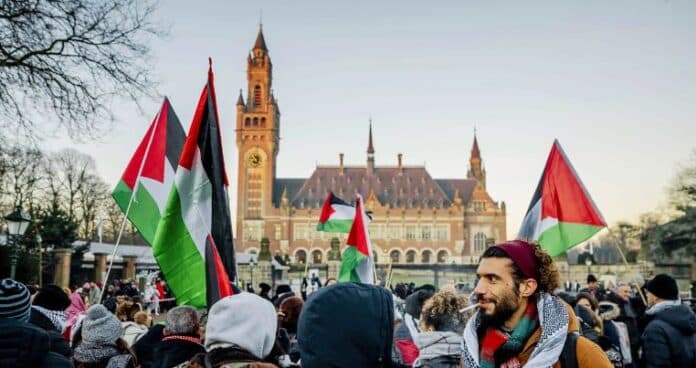International Court of Justice (ICJ) has delivered an initial ruling in the landmark case brought forward by South Africa against Israel. Pretoria accused Israel of committing genocide during its military campaign in the Gaza Strip following attacks by Hamas on 7 October 2023. Israel vehemently denies the allegations. However, the court has mandated Israel to implement a series of “provisional measures” aimed at preventing the potential occurrence of genocide.
Does it Mean Peace Between Israel and Palestine?
The ruling is complex and has significant implications for the ongoing conflict. While South Africa called it a “decisive victory” for international law, the court did not make a definitive judgement on this issue. It only gave an order to Israel to “take all measures within its power to prevent the commission of acts of genocide” in Gaza. This includes avoiding unnecessary harm to civilians, ensuring essential aid reaches Gaza, and investigating possible incitement to genocide.
It is also not clear whether Israel will comply with ICJ’s order. Israeli Prime Minister Benjamin Netanyahu strongly criticized the ruling, labeling it as “false” and “outrageous”. In a video message released shortly after the court order, he asserted that Israel is engaged in a “just war like no other”. Netanyahu emphasized that the country will persist in defending itself and its citizens while maintaining adherence to international law.
Despite the urgency of the situation, the court did not directly order a ceasefire between Israel and Hamas. This leaves the onus on both parties to either negotiate an end to the conflict or blow each other to smithereens.
What Has the Reaction Been?
The ruling has been met with mixed reactions. Pro-Palestinians view it as a vindication of their claims and a step towards accountability, while pro-Israel groups reject the genocide allegation and criticize the court’s jurisdiction. The international community is divided, with some countries urging compliance with the ruling and others expressing concern about its implications for the peace process.
Despite some disappointment due to the ICJ not issuing an immediate ceasefire, legal experts argue that a reduction in hostilities is essential for the implementation of the ICJ’s order. The ICJ’s ruling marks a significant development in holding Israel accountable for alleged genocide.
While the ICJ lacks enforcement mechanisms, the provisional measures deliver a moral victory to Gazans and challenge Israel’s narrative. The ruling questions Israel’s “victim status” which it has been using for 75 years. Israel has leveraged Western guilt stemming from the failure to prevent the atrocities of the Holocaust orchestrated by Nazi Germany.
The Holocaust was undoubtedly a horrible crime against humanity which resulted in the annihilation of 5 to 6 million Jews. In the eyes of the Western world, Israel found justification in prioritizing the security of its people by drawing upon the historical trauma, even if it meant the expulsion of Palestinians and the ongoing occupation of their land.
Future Implications
The ruling still keeps Israel under legal scrutiny for its actions in Gaza, pressurizing the government to modify its approach. The court will consider whether Israel complies with its orders in the coming months, potentially imposing further measures or finding them in violation of international law.
It’s important to note that the situation is still evolving, and the long-term implications of the ruling remain to be seen. The UN Security Council is scheduled to discuss the ruling on Wednesday, 31 January 2024, which could add another layer of complexity to the situation.


